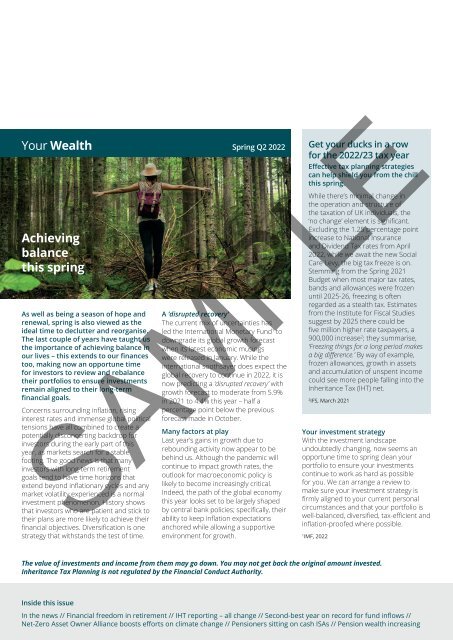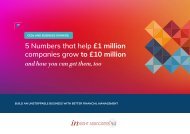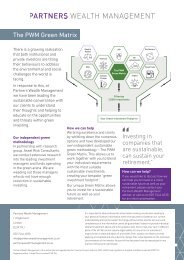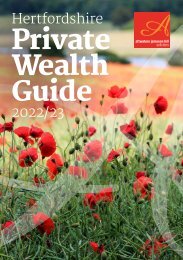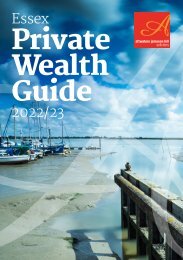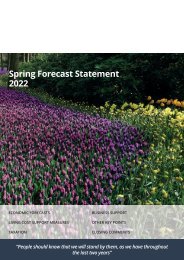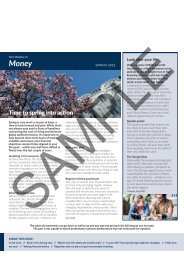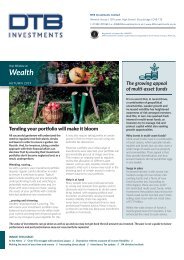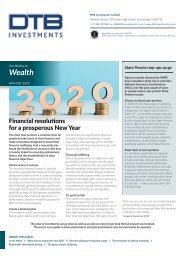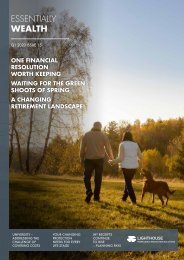TOMD - Newsletters Spring Q2 Your Window on Wealth
- No tags were found...
Create successful ePaper yourself
Turn your PDF publications into a flip-book with our unique Google optimized e-Paper software.
<str<strong>on</strong>g>Your</str<strong>on</strong>g> <strong>Wealth</strong> <str<strong>on</strong>g>Spring</str<strong>on</strong>g> <str<strong>on</strong>g>Q2</str<strong>on</strong>g> 2022 Get your ducks in a row<br />
Achieving<br />
balance<br />
this spring<br />
As well as being a seas<strong>on</strong> of hope and<br />
renewal, spring is also viewed as the<br />
ideal time to declutter and reorganise.<br />
The last couple of years have taught us<br />
the importance of achieving balance in<br />
our lives – this extends to our finances<br />
too, making now an opportune time<br />
for investors to review and rebalance<br />
their portfolios to ensure investments<br />
remain aligned to their l<strong>on</strong>g-term<br />
financial goals.<br />
C<strong>on</strong>cerns surrounding inflati<strong>on</strong>, rising<br />
interest rates and immense global political<br />
tensi<strong>on</strong>s have all combined to create a<br />
potentially disc<strong>on</strong>certing backdrop for<br />
investors during the early part of this<br />
year, as markets search for a stable<br />
footing. The good news is that many<br />
investors with l<strong>on</strong>g-term retirement<br />
goals tend to have time horiz<strong>on</strong>s that<br />
extend bey<strong>on</strong>d inflati<strong>on</strong>ary cycles and any<br />
market volatility experienced is a normal<br />
investment phenomen<strong>on</strong>. History shows<br />
that investors who are patient and stick to<br />
their plans are more likely to achieve their<br />
financial objectives. Diversificati<strong>on</strong> is <strong>on</strong>e<br />
strategy that withstands the test of time.<br />
A ‘disrupted recovery’<br />
The current mix of uncertainties has<br />
led the Internati<strong>on</strong>al M<strong>on</strong>etary Fund 1 to<br />
downgrade its global growth forecast<br />
when its latest ec<strong>on</strong>omic musings<br />
were released in January. While the<br />
internati<strong>on</strong>al soothsayer does expect the<br />
global recovery to c<strong>on</strong>tinue in 2022, it is<br />
now predicting a ‘disrupted recovery’ with<br />
growth forecast to moderate from 5.9%<br />
in 2021 to 4.4% this year – half a<br />
percentage point below the previous<br />
forecast made in October.<br />
Many factors at play<br />
Last year’s gains in growth due to<br />
rebounding activity now appear to be<br />
behind us. Although the pandemic will<br />
c<strong>on</strong>tinue to impact growth rates, the<br />
outlook for macroec<strong>on</strong>omic policy is<br />
likely to become increasingly critical.<br />
Indeed, the path of the global ec<strong>on</strong>omy<br />
this year looks set to be largely shaped<br />
by central bank policies; specifically, their<br />
ability to keep inflati<strong>on</strong> expectati<strong>on</strong>s<br />
anchored while allowing a supportive<br />
envir<strong>on</strong>ment for growth.<br />
for the 2022/23 tax year<br />
Effective tax planning strategies<br />
can help shield you from the chill<br />
this spring.<br />
While there’s minimal change in<br />
the operati<strong>on</strong> and structure of<br />
the taxati<strong>on</strong> of UK individuals, the<br />
‘no change’ element is significant.<br />
Excluding the 1.25 percentage point<br />
increase to Nati<strong>on</strong>al Insurance<br />
and Dividend Tax rates from April<br />
2022, while we await the new Social<br />
Care Levy, the big tax freeze is <strong>on</strong>.<br />
Stemming from the <str<strong>on</strong>g>Spring</str<strong>on</strong>g> 2021<br />
Budget when most major tax rates,<br />
bands and allowances were frozen<br />
until 2025-26, freezing is often<br />
regarded as a stealth tax. Estimates<br />
from the Institute for Fiscal Studies<br />
suggest by 2025 there could be<br />
five milli<strong>on</strong> higher rate taxpayers, a<br />
900,000 increase 2 ; they summarise,<br />
‘Freezing things for a l<strong>on</strong>g period makes<br />
a big difference.’ By way of example,<br />
frozen allowances, growth in assets<br />
and accumulati<strong>on</strong> of unspent income<br />
could see more people falling into the<br />
Inheritance Tax (IHT) net.<br />
2<br />
IFS, March 2021<br />
<str<strong>on</strong>g>Your</str<strong>on</strong>g> investment strategy<br />
With the investment landscape<br />
undoubtedly changing, now seems an<br />
opportune time to spring clean your<br />
portfolio to ensure your investments<br />
c<strong>on</strong>tinue to work as hard as possible<br />
for you. We can arrange a review to<br />
make sure your investment strategy is<br />
firmly aligned to your current pers<strong>on</strong>al<br />
circumstances and that your portfolio is<br />
well-balanced, diversified, tax-efficient and<br />
inflati<strong>on</strong>-proofed where possible.<br />
SAMPLE<br />
1<br />
IMF, 2022<br />
The value of investments and income from them may go down. You may not get back the original amount invested.<br />
Inheritance Tax Planning is not regulated by the Financial C<strong>on</strong>duct Authority.<br />
Inside this issue<br />
In the news // Financial freedom in retirement // IHT reporting – all change // Sec<strong>on</strong>d-best year <strong>on</strong> record for fund inflows //<br />
Net-Zero Asset Owner Alliance boosts efforts <strong>on</strong> climate change // Pensi<strong>on</strong>ers sitting <strong>on</strong> cash ISAs // Pensi<strong>on</strong> wealth increasing
Dividend growth 2022 –<br />
cautious optimism<br />
IN THE<br />
News<br />
A recent report 3 has revealed a<br />
dramatic rebound in UK dividends in<br />
2021, increasing 46.1% last year to<br />
total £94.1bn. This figure was boosted<br />
by a record £16.9bn in special<br />
dividends, three times the normal<br />
level. For 2022, the report expects<br />
underlying growth of 5% to bring<br />
total payouts to £81bn, with banks<br />
and oil companies expected to be<br />
the main c<strong>on</strong>tributors. Expectati<strong>on</strong>s<br />
are that special dividends are likely<br />
to be much lower this year. Despite<br />
headwinds such as inflati<strong>on</strong> and new<br />
COVID variants, Managing Director<br />
of Corporate Markets EMEA at Link<br />
Group Ian Stokes believes, “The<br />
recovery in UK dividends is not complete,<br />
but the easiest part of the catch up<br />
is now behind us… As the pandemic<br />
c<strong>on</strong>tinues, it would be easy to take a<br />
knife to our expectati<strong>on</strong>s for dividends<br />
for the coming year. We are, however,<br />
cautiously optimistic that most sectors<br />
can deliver growth.”<br />
D<strong>on</strong>’t risk a double tax hit<br />
<strong>on</strong> your pensi<strong>on</strong><br />
Data from the Financial C<strong>on</strong>duct<br />
Authority 4 shows that the number<br />
of pensi<strong>on</strong> pots accessed for the<br />
first time in 2020-21 totalled<br />
596,080; the number fully withdrawn<br />
totalled 341,404. Only 33% of<br />
c<strong>on</strong>sumers taking m<strong>on</strong>ey from<br />
their pensi<strong>on</strong> for the first time took<br />
regulated advice. People cashing in<br />
pensi<strong>on</strong> pots without taking advice<br />
could be putting themselves at<br />
risk of paying more tax, and those<br />
cashing in pots in <strong>on</strong>e go could pay<br />
up to 45% Income Tax <strong>on</strong> part of<br />
their withdrawal, while also losing<br />
Inheritance Tax protecti<strong>on</strong>.<br />
3<br />
Link Group, 2022, 4 FCA, Dec 2021<br />
Financial freedom<br />
in retirement<br />
When are you thinking of retiring?<br />
With many pre-retirees reassessing<br />
their lives and priorities in the wake<br />
of the pandemic, there really is a<br />
seismic shift for many people towards<br />
achieving life balance. People need<br />
a plan to flex with their changing<br />
aspirati<strong>on</strong>s – it’s become more about<br />
living life rather than going through<br />
the moti<strong>on</strong>s of the daily grind.<br />
With earlier retirement a serious<br />
c<strong>on</strong>siderati<strong>on</strong> for many seeking balance,<br />
a quarter of Brits who aspire to retire<br />
early feel that age 60 is the optimum<br />
time to do so 5 .<br />
Positive steps to a new lifestyle<br />
What really makes you happy? If you’re<br />
planning to celebrate your 60th birthday<br />
by saying ‘goodbye’ to working life,<br />
it’s good to know that 68% of people<br />
report an increase in overall happiness<br />
as a result of retiring early, with 44%<br />
of early retirees reporting their family<br />
relati<strong>on</strong>ships improved and 34% citing<br />
improvements in their friendships. From<br />
a health perspective, 57% of early retiree<br />
resp<strong>on</strong>dents report a boost to their<br />
mental wellbeing, with 50% believing<br />
their physical wellbeing has improved.<br />
In the driving seat<br />
Nearly a third (32%) of people who<br />
retired early or plan to do so are driven<br />
by the desire ‘to enjoy more freedom while<br />
still being physically fit and well enough<br />
to enjoy it.’<br />
Other factors driving people to pursue<br />
early retirement include financial security<br />
(26%), reassessing priorities and what’s<br />
important to them in life (23%), wishing<br />
to spend more time with family (20%),<br />
finding they are either ‘tired or bored’<br />
of working (19%). Stress is also a<br />
c<strong>on</strong>tributing factor that 19% of<br />
resp<strong>on</strong>dents are keen to irradicate.<br />
Time to reflect<br />
With a sizable 24% of people returning<br />
to work after retiring because they<br />
experience financial issues, careful<br />
planning is essential. Interestingly, 47%<br />
of retirees found that their finances<br />
worsened and <strong>on</strong>ly 22% felt they<br />
benefited financially from their decisi<strong>on</strong><br />
to retire early.<br />
<str<strong>on</strong>g>Your</str<strong>on</strong>g> plan<br />
People cite steps toward making early<br />
retirement achievable like paying off a<br />
mortgage (30%), saving little and often<br />
(29%), saving extra when they receive a<br />
pay rise or b<strong>on</strong>us (19%) and receiving an<br />
inheritance (14%).<br />
SAMPLE<br />
We’re here to reassure you that<br />
happiness doesn’t need to come at a<br />
cost when retiring early. Although it’s very<br />
important to be realistic, with meticulous<br />
planning and careful c<strong>on</strong>siderati<strong>on</strong>, we<br />
can assess and develop a robust plan<br />
to align and flex with your changing<br />
requirements and priorities.<br />
5<br />
Aviva, Dec 2021<br />
The value of investments and income from them may go down. You may not get back the original amount invested. A pensi<strong>on</strong> is a<br />
l<strong>on</strong>g-term investment. The fund value may fluctuate and can go down. <str<strong>on</strong>g>Your</str<strong>on</strong>g> eventual income may depend <strong>on</strong> the size of the fund at<br />
retirement, future interest rates and tax legislati<strong>on</strong>.<br />
<str<strong>on</strong>g>Your</str<strong>on</strong>g> <strong>Wealth</strong> <str<strong>on</strong>g>Spring</str<strong>on</strong>g> <str<strong>on</strong>g>Q2</str<strong>on</strong>g> 2022
IHT reporting – all change<br />
Keeping up to date with tax changes<br />
can be challenging and you may have<br />
missed this <strong>on</strong>e in relati<strong>on</strong> to the<br />
reporting of Inheritance Tax (IHT),<br />
especially as it’s not something most of<br />
us will deal with very often.<br />
‘Excepted estate’<br />
The changes came in at the start of the<br />
year and apply to the estate of any<strong>on</strong>e<br />
who dies <strong>on</strong> or after 1 January 2022. Now,<br />
before you make a report to HM Revenue<br />
and Customs (HMRC) you need to check<br />
whether the estate is an ‘excepted estate’ to<br />
make sure you complete the right forms.<br />
There are several reas<strong>on</strong>s why an estate<br />
may now be classified as ‘excepted’:<br />
• The estate has a value below the<br />
current IHT threshold (£325,000<br />
for <strong>on</strong>e pers<strong>on</strong>)<br />
• Any unused threshold is being<br />
transferred from a spouse or civil<br />
partner who died first, and the estate is<br />
worth £650,000 or less<br />
• The estate is worth less than £3m and<br />
the deceased left everything in their<br />
estate to their surviving spouse or civil<br />
partner who lives in the UK, or to a<br />
qualifying registered UK charity<br />
• The estate has UK assets worth less<br />
than £150,000 and the deceased had<br />
permanently been living outside of the<br />
UK when they died.<br />
Further details <strong>on</strong> how to value an estate<br />
for IHT and report its value can be found<br />
here www.gov.uk/valuing-estate-ofsome<strong>on</strong>e-who-died/check-type-of-estate<br />
<str<strong>on</strong>g>Your</str<strong>on</strong>g> IHT planning<br />
More people are having to pay IHT; HMRC<br />
figures show IHT receipts for the period<br />
April 2021 to January 2022 to be £5bn,<br />
which is a £700m increase <strong>on</strong> the same<br />
period <strong>on</strong>e-year earlier 6 . IHT planning is a<br />
complicated subject, but sensible financial<br />
planning can help to reduce the amount<br />
of IHT payable and safeguard your wealth<br />
for the future.<br />
6<br />
HMRC, 2022<br />
Sensible financial planning<br />
can help to reduce the<br />
amount of IHT payable and<br />
safeguard your wealth for<br />
the future<br />
Sec<strong>on</strong>d-best year <strong>on</strong><br />
record for fund inflows<br />
Despite the pandemic, new stats<br />
from The Investment Associati<strong>on</strong><br />
(IA) 7 show investors added over<br />
£43bn to funds last year, the<br />
sec<strong>on</strong>d highest recorded. The<br />
IA details a key finding ‘inflows<br />
to resp<strong>on</strong>sible investment funds<br />
totalled a record £16bn, up £4.3bn<br />
<strong>on</strong> 2020.’<br />
In December, net retail sales<br />
reached £2.3bn. Equity funds<br />
were the most popular asset class<br />
with £1bn of inflows, with ‘global’<br />
remaining the best-selling sector for<br />
the seventh c<strong>on</strong>secutive m<strong>on</strong>th.<br />
Chief Executive of the IA Chris<br />
Cummings commented <strong>on</strong> the<br />
findings, “Investors put their lockdown<br />
savings to work in 2021, with near<br />
record inflows to retail funds in 2021<br />
helping investors take part in the<br />
global COVID-19 market bounce. This<br />
was particularly so in the first half of<br />
the year, when m<strong>on</strong>thly inflows into<br />
funds peaked at £6.2bn at the end<br />
of the 2021 ISA seas<strong>on</strong> in April. While<br />
new variants of COVID-19 appeared<br />
throughout the year, every m<strong>on</strong>th<br />
of 2021 saw net inflows – against a<br />
backdrop of rising prices eroding the<br />
value of saving in cash.”<br />
He c<strong>on</strong>tinued, “The return of<br />
significant inflati<strong>on</strong> in the sec<strong>on</strong>d<br />
half of 2021 indeed left its mark,<br />
with falling flows into b<strong>on</strong>d funds,<br />
but overall investor c<strong>on</strong>fidence<br />
remained resilient. Growing focus<br />
<strong>on</strong> climate change in the year<br />
Glasgow hosted COP26 also helped<br />
take flows into resp<strong>on</strong>sible investment<br />
funds to new heights.”<br />
SAMPLE<br />
7<br />
The Investment Associati<strong>on</strong>, 2022<br />
The value of investments and income from them may go down. You may not get back the original amount invested.<br />
Inheritance Tax Planning is not regulated by the Financial C<strong>on</strong>duct Authority.<br />
<str<strong>on</strong>g>Your</str<strong>on</strong>g> <strong>Wealth</strong> <str<strong>on</strong>g>Spring</str<strong>on</strong>g> <str<strong>on</strong>g>Q2</str<strong>on</strong>g> 2022
Net-Zero Asset Owner Alliance<br />
elevate climate change efforts<br />
With a pledge to reduce<br />
envir<strong>on</strong>mentally damaging<br />
emissi<strong>on</strong>s from portfolios by<br />
half by 2030 and to accelerate<br />
sustainable finance, the influential<br />
investor group Net-Zero Asset<br />
Owner Alliance has ramped<br />
up its commitment to tackle<br />
climate change.<br />
The prominent investor group,<br />
comprising 70 large instituti<strong>on</strong>s, has<br />
pledged that member firms will aim<br />
to reduce emissi<strong>on</strong>s linked to their<br />
portfolios of investments by between<br />
49 and 65% in the next eight years<br />
(to 2030), after including a broader<br />
Pensi<strong>on</strong>ers sitting <strong>on</strong> cash ISAs<br />
An alarming set of data has come to<br />
light. Over three milli<strong>on</strong> pensi<strong>on</strong>ers are<br />
holding all of their ISA savings in cash! 8<br />
The analysis highlighted that during the<br />
most recent year for which figures were<br />
available (2018-19), there were 5.8 milli<strong>on</strong><br />
over-65s holding ISAs, valued at just over<br />
£305bn in total, the average amount<br />
held was £52,500. However, 3.4 milli<strong>on</strong> of<br />
these were holding an average of £25,383<br />
exclusively in cash ISAs, with a total<br />
amount of £87bn sat in these vehicles.<br />
If you would like any<br />
advice or informati<strong>on</strong><br />
<strong>on</strong> any of the areas<br />
highlighted in this<br />
newsletter, please<br />
get in touch.<br />
range of carb<strong>on</strong>-intensive sectors<br />
within its target framework.<br />
This new commitment expands<br />
previous plans targeting a reducti<strong>on</strong><br />
in portfolio emissi<strong>on</strong>s by between<br />
16 and 29% across listed equities,<br />
publicly traded corporate b<strong>on</strong>ds and<br />
real estate assets by 2025. The newly<br />
expanded framework now includes<br />
sectors where carb<strong>on</strong> emissi<strong>on</strong><br />
reducti<strong>on</strong>s are more challenging to<br />
achieve due to producti<strong>on</strong> methods,<br />
including agriculture, chemicals,<br />
water, c<strong>on</strong>crete and aluminium, al<strong>on</strong>g<br />
with new asset class – infrastructure<br />
equity and debt.<br />
With very few of these 3.4m pensi<strong>on</strong>ers<br />
likely to be earning interest of more<br />
than 1%, and many c<strong>on</strong>siderably less,<br />
former Pensi<strong>on</strong>s Minister Steve Webb<br />
commented, “Whilst holding small amounts<br />
of cash in an easy access account can be<br />
c<strong>on</strong>venient, these figures show that huge<br />
amounts of m<strong>on</strong>ey are sitting rotting in<br />
cash ISAs. Inflati<strong>on</strong> is like a tax <strong>on</strong> savers.<br />
With inflati<strong>on</strong> soaring, the spending power<br />
of cash savings is being savagely reduced.<br />
Many instant access cash ISAs pay little or<br />
no interest and runaway inflati<strong>on</strong> will take a<br />
huge chunk out of the value of these savings.”<br />
He c<strong>on</strong>tinued, “Older savers need to<br />
c<strong>on</strong>sider urgently whether keeping their<br />
m<strong>on</strong>ey in these cash accounts is the best<br />
way to protect their hard-earned savings,<br />
especially when the real value of their<br />
State Pensi<strong>on</strong> is also being squeezed.”<br />
8<br />
LCP, Freedom of Informati<strong>on</strong>, 2022<br />
Pensi<strong>on</strong> wealth increasing<br />
New data from the Office for<br />
Nati<strong>on</strong>al Statistics (ONS) <strong>Wealth</strong><br />
and Assets Survey 9 has revealed<br />
that the largest single comp<strong>on</strong>ent<br />
of household wealth is private<br />
pensi<strong>on</strong> holdings.<br />
In the latest recorded period (April 2018<br />
to March 2020) pensi<strong>on</strong>s represented<br />
42% of aggregate wealth, up from<br />
34% (2006-08), an increase in pensi<strong>on</strong><br />
wealth of nearly £70k <strong>on</strong> average for<br />
UK households. This growth can be<br />
attributed to various factors including<br />
more households having private<br />
pensi<strong>on</strong>s due to auto-enrolment and<br />
rising l<strong>on</strong>gevity meaning pensi<strong>on</strong><br />
savings have increased proporti<strong>on</strong>ally.<br />
Meanwhile, property wealth (minus<br />
mortgage debt) made up 36% of<br />
household wealth; financial wealth, or<br />
savings or investments, made up 13%;<br />
and physical wealth, such as cars and<br />
house c<strong>on</strong>tents, totalled 9%.<br />
Underlying wealth per household<br />
for the latest recorded period was<br />
£302,500 at the median or midpoint<br />
level, which is up from £286,600 in<br />
the previous two years, and up by<br />
a fifth over the past 14 years, when<br />
adjusted for inflati<strong>on</strong>. The data also<br />
shows median wealth was highest for<br />
households where a member was aged<br />
between 55 years and State Pensi<strong>on</strong><br />
age; the figure of £553,400 being 25<br />
times higher than for those aged 16-24<br />
years of age. The wealthiest 10% of<br />
households held 43% of all the wealth,<br />
whereas the bottom 50% held <strong>on</strong>ly 9%.<br />
9<br />
ONS, 2022<br />
The value of investments and income from them may go down. You may not get back the original amount invested. A pensi<strong>on</strong><br />
is a l<strong>on</strong>g-term investment. The fund value may fluctuate and can go down. <str<strong>on</strong>g>Your</str<strong>on</strong>g> eventual income may depend <strong>on</strong> the size of the<br />
fund at retirement, future interest rates and tax legislati<strong>on</strong>.<br />
SAMPLE<br />
It is important to take professi<strong>on</strong>al advice before making any decisi<strong>on</strong> relating to your pers<strong>on</strong>al finances. Informati<strong>on</strong> within<br />
this document is based <strong>on</strong> our current understanding and can be subject to change without notice and the accuracy and<br />
completeness of the informati<strong>on</strong> cannot be guaranteed. It does not provide individual tailored investment advice and is for guidance<br />
<strong>on</strong>ly. Some rules may vary in different parts of the UK. We cannot assume legal liability for any errors or omissi<strong>on</strong>s it might c<strong>on</strong>tain.<br />
Levels and bases of, and reliefs from taxati<strong>on</strong> are those currently applying or proposed and are subject to change; their value<br />
depends <strong>on</strong> the individual circumstances of the investor. No part of this document may be reproduced in any manner without<br />
prior permissi<strong>on</strong>.<br />
The value of investments can go down as well as up and you may not get back the full amount you invested. The past is not a guide<br />
to future performance and past performance may not necessarily be repeated. If you withdraw from an investment in the early<br />
years, you may not get back the full amount you invested. Changes in the rates of exchange may have an adverse effect <strong>on</strong> the value<br />
or price of an investment in sterling terms if it is denominated in a foreign currency.<br />
Informati<strong>on</strong> is based <strong>on</strong> our understanding of taxati<strong>on</strong> legislati<strong>on</strong> and regulati<strong>on</strong>s.<br />
Tax treatment is based <strong>on</strong> individual circumstances and may be subject to change in the future.<br />
All details correct at time of writing (March).<br />
<str<strong>on</strong>g>Your</str<strong>on</strong>g> <strong>Wealth</strong> <str<strong>on</strong>g>Spring</str<strong>on</strong>g> <str<strong>on</strong>g>Q2</str<strong>on</strong>g> 2022


